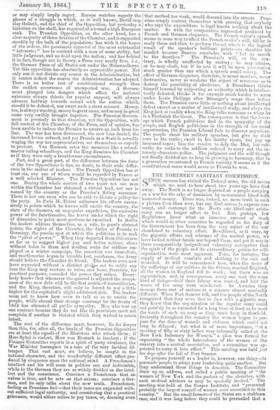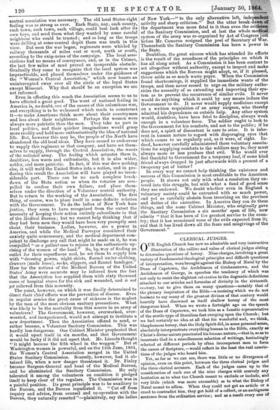THE NORTHERN SANITA.RY COMMISSION.
Q INC E success has visited the Federal arms, the old sneers L) which we used to hear about two years ago have died away. The North is no longer depicted as a people carrying on a war for the sake of dominion by mercenaries hired with borrowed money. There was, indeed, no more truth in such a picture then than now, but any libel serves to express con- tempt, and contempt for the North our third-rate aristo- cracy can no longer affect to feel. But, perhaps, few Englishmen know what an immense amount of work which would in other countries be regarded as the duty of the Government has been from the very outset of the war abandoned to voluntary effort. Bewildered, as it were, by the gigantic efforts and schemes of the central power, we have looked neither beside nor beyond them, and yet it was in these comparatively insignificant voluntary enterprises that the spirit of the people and its extraordinary genius for self- organization were most apparent. Take, for instance, the supply of medical comforts and clothing to the sick and wounded. It will be remembered how, when the news of the sufferings of our soldiers in the Crimea reached England, all the women in England fell to work ; but there was no organization, and, in consequence, every one sent the same kind of things—half their labour was wasted, and half the wants of the army went unrelieved. In America they manage these sort of matters in a manner almost comically different. When Fort Sumter fell, and the people of the North recognized that they were face to face with a gigantic war, they knew that the orginization of the regular army could not possibly be so extended for a long time at least as to meet the wants of such an army as they must keep in theefield. Instantly throughout the country the women began to pre- pare for the time of wounds and sickness which could not long be delayed ; but what is of more importance, "at a meeting of fifty or sixty ladies very informally called at the New York Infirmary for Women," a plan was formed for organizing "the whole benevolence of the women of the country into a central association, and a committee was ap- pointed to carry it into effect." This meeting was held just ten days after the fall of Fort Sumter. To propose yourself as a leader is, however, one thing—to persuade people to adopt your leadership quite another. But they understand these things in America. The Committee drew up an address, and called a public meeting of "the women of New York and the pastors of the churches, with such medical advisers as may be specially invited." The meeting was held at the Cooper Institute, and "presented probably the largest council of women ever assembled in this country." But the small farmers of the States are a stubborn race, and it was long before they could be persuaded that a anxiety quite unnecessary, and the medical department com- petent to discharge any call that might be made on it, he was compelled 'as a gallant man to rejoice in the enthusiastic up- rising of the women of the land." So, byway of finding an outlet for their superfluous zeal, he set them to supply him with "dressing gowns, night-shirts, flannel under-clothing, drawers (made loose), socks, slippers, and flannel bandages." How. far the notions of the Medical Bureau of the United States' Army were accurate may be inferred from the fact that the Association has supplied them with sixty thousand cases of hospital stores for the sick and wounded, and is not yet relieved from this necessity.
The point, however, on which it was finally determined to direct their chief efforts was the prevention of disease. Even in regular armies the great cause of sickness is the neglect by the men of the most obvious sanitary precautions. What was likely to be the mortality from this source in an army of volunteers? The Government, however, overworked, over- worried, and inexperienced, would not attempt to institute a new department. Then the Association offered to send, or rather become, a Volunteer Sanitary Commission. This was hardly less dangerous. One Cabinet Minister prophesied that it would upset itself in six months, and that Government would be lucky if it did not upset that. Mr. Lincoln thought "it might become the fifth wheel in the waggon." But at Washington woman is powerful, and on the 13th June, 1861, the Woman's Central Association merged in the United States Sanitary Commission. Scarcely, however, had it ob- tained life, when a new danger threatened it. Dr. Finley became Surgeon-General and head of the Medical Bureau, and he abominated the Sanitary Commission. He only tolerated it among the volunteers on condition it pledged itself to keep clear of the regulars. The Commission was in a painful position. Its great principle was to be auxiliary to the Bureau, and the Bureau repudiated it. "Cut off from inquiry and advice, from counsel and co-operation with the Bureau, they naturally resorted "—plaintively, say the ladies central association was necessary. The old local States-right of New York—" to the only alternative left, independent feeling was as strong as ever. Each State, nay, each county, activity and sharp criticism." But the utter break-down of each town, each town, each village, could best look after its the department was more fatal to it than even the criticism own boys, and send them what they wanted by some careful of the Sanitary Commission, and at last the whole medical neighbour who could be trusted ; and so long as the troops system of the army was re-organized by Act of Congress just were drilling at some central depot there was truth in this before Mr. Cameron resigned the post of Secretary of War. view. But soon the war began, regiments were whirled by Thenceforth the Sanitary Commission has been a power in railway thousands of miles east or west, north or south, the State. according to the exigencies of the campaign. The local asso- Doubtless, the great siiccess which has attended its efforts ciations had no means of conveyance, and, as in the Crimea, is the result of the soundness of the principles on which it the last few miles of mud proved an insuperable obstacle, has all along acted. As a Commission it has been content to Gradually they came to recognize that the local system was act altogether without authority, except to inspect and make impracticable, and placed themselves under the guidance of suggestions which the Bureau might adopt, or, if it pleased, the "Woman's Central Association," which now boasts an throw aside as so much waste paper. When the Commission uninterrupted sway over all the circle of the loyal States found shortcomings, it supplied the immediate wants of the except Missouri. Why that should be an exception we are troops, and then never ceased to urge on the military autho- not informed. rities the necessity of so extending and improving their Bys- Even in effecting this much the Association seems to us to tern as to prevent the recurrence of similar evils. It never have effected a great good. The want of national feeling in would do anything which it could by any means induce the America is, no doubt, one of the causes of this calamitous war, Government to do. It never would supply medicines except and everything is to be welcomed which tends to counteract on a written requisition of an army surgeon, who thereby it—to make Americans think more about their countrymen admitted his dependence on outside help. Any other system and less about their neighbours. Perhaps the women were would, doubtless, have been fatal to discipline, always weak always more patriotic than the men. They take no part in enough in a volunteer force. The soldier ought to look to local politics, and their quicker imaginations would grasp the Government for his comforts, and not to the public; if he more readily and hold more enthusiastically the idea of national does not, a spirit of discontent is sure to arise. It is inhe- life. But, however this may be, the people of the North have rent in human nature to regard with disparaging eyes that abandoned the old local ideas. They have ceased to endeavour which comes to us regularly and, as it were, of right. In- to supply this regiment or that company, and have set them- deed, however carefully administered these voluntary associa- selves to supply, through the Central Association, the wants tions for supplying comforts to the soldiers may be, they must of the national army. The feeling which actuates them is, always more or less produce that evil. Who would ever doubtless, less warm and enthusiastic, but it is also wider, feel thankful to Government for a tenpenny loaf, if some kind nobler, and more patriotic. In fact, if this war does nothing friend always dropped in just afterwards with a present of a else, it will weld the United States into a nation, and in pro- twopenny pat of butter?































 Previous page
Previous page